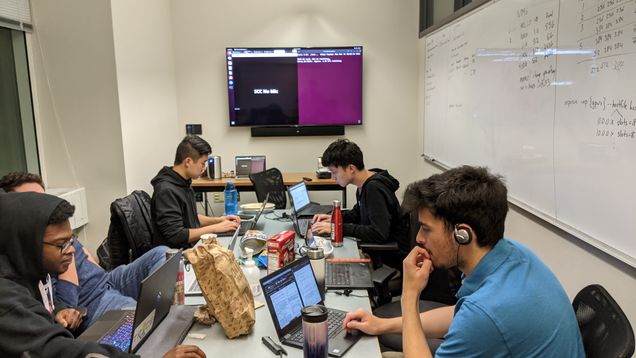Greater Than the Sum
Students hone skills and hold their own in an international competition of computing
By Patrick L. Kennedy
Ben Li (’22) says he had “no clue” what high-performance computing (HPC) was when he was a freshman. But, as a senior this past fall, Li served as president of the Boston University High Performance Computing club, led his team to a strong finish in an international HPC competition, and landed a job offer as an HPC engineer at a major cloud computing company.
“It’s unusual to have this kind of background as an undergrad,” says Professor Martin Herbordt (ECE), the club’s faculty advisor. But, for a little-understood, somewhat niche field, high-performance computing has an tremendous impact, fueling data insights in medicine, climate science, energy, finance, and other industries.
That’s why, historically, BU has played a prominent role in educating HPC engineers, says Herbordt. Key to engaging students in the field is sending them to the kind of international collegiate competition where the Boston squad did so well this fall. At SC21, the Massachusetts Green Team—consisting of Li, fellow ENG student Carlton Knox (’23), two other BU students, and one each from Boston College and UMass–Lowell—earned the highest score of the American collegiate teams in one category, HPCG, and they scored third-highest overall in benchmarking.
While he had little idea what HPC was as a freshman, Li can explain it now.
“All the Covid simulations that helped us get the vaccine so quickly are based on high-performance computing,” says Li. “Medical companies, financial companies—they’ll have a bunch of data they need to do analysis on, or numbers they need to be crunched. They ask a cloud company, ‘Can you spin up a cluster for us, run our program, and give us the results?’”
A cluster is simply a network of server computers that assemble into a larger and more powerful system that can handle data-intensive problems in research, modeling, and visualization.
“These computers are for grand challenges,” says Herbordt. “Modeling molecules and other biological phenomena, modeling nuclear fusion for power. The military uses [HPC] to make sure the arsenal doesn’t blow itself up; Japanese scientists use it in modeling tsunamis; astronomers in modeling the formation of galaxies going back to the Big Bang.”
The computer engineers who fill this niche are in high demand, Herbordt adds, and command high salaries. Herbordt recalls hearing an Intel engineer say the highest-paid programmers are the “optimizers, the ones who know computer architecture and can use it to make code go fast.”

Making code go fast is what the SC21 student competition was all about. Just 10 teams—five from China, five from the U.S.—made the cut this year. “It’s really competitive just to get a team in the competition,” says Herbordt. Each team was given 72 hours to build a cluster and complete seven complex tasks—for example, reproducing the results of a scientific paper or running a suite for electronic-structure modeling.
The Massachusetts teammates sweated it out in a BU conference room for three days. They constructed a cluster that was greater than the sum of its parts, and they used every trick they knew (including some learned in Herbordt’s graduate-level class) to coax more power out of the system. When time was up, they had topped the U.S. entrants—Clemson University, Georgia Institute of Technology, USC–San Diego, and Wake Forest University—in one of the benchmarking challenges, high-performance conjugate gradient. “It’s essentially a measure of raw compute power for the cluster,” says Li.
Moreover, the team placed third in benchmarking overall. Their score was 14 times higher than in their previous outing. In fact, this was the first time the team had completed all seven of the tasks.
It’s an impressive showing, especially given what they were up against: The Chinese government puts a high priority on supporting the development of young HPC engineers, says Herbordt.
More important, the students gained practical experience and made industry connections. The hiring manager who interviewed Li found it notable that he led a team that had even entered the SC21 competition.
“He was like, ‘Wait, say that again? You know HPC?’” Li recalls. “’That’s something that college students don’t usually come out with any experience in.’”
Li feels fortunate to be on the crest of the HPC wave, as the industry is only expected to grow. “In the coming years,” says Li, “high-performance, cloud cluster computing is going to become a lot more important to our daily lives.”
The banner was created by Gabriella McNevin-Melendez with photography provided by the HPC team and Daniel Josef from Unsplash